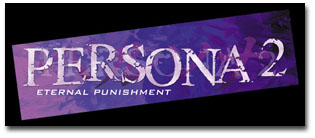
 |
|
The thing to remember is that every game of the franchise shares several traits and an overall flavor: occultism figures largely into the theme, demons are ubiquitous, and most of the games take place in a modern setting. Eternal Punishment also shares several characters with Innocent Sin and even a few from Persona 1, although the number of gamers who will be familiar with them are in the minority. The good news is that while Eternal Punishment is the follow up to Innocent Sin, you can follow the storyline without having played its predecessor.
Not quite a full sequel, Eternal Punishment re-uses Innocent Sin's game engine to resolve some plot threads left hanging at the conclusion of the first game. The cast of characters, however, is mostly new. Innocent Sin's heroine Maya Amano is now the main character; original lead Tatsuya Suo returns as a supporting team-mate. Aiding them are Maya's roommate Ulala Serizawa, Tatsuya's brother Katsuya Suo, computer expert Baofu, and two returning characters from Persona 1: Nate and Ellen. And if there's one thing that sets Eternal Punishment apart from the standard RPG fare, it would be the storyline. Right from the outset, the premise is anything but typical: should you become angry enough with someone to want him dead, just give your own cell phone a call, and the inimical Joker will answer the call, killing whomever you wish. But there's a catch; by using the "Joker Curse," there's a chance that you yourself may become the next Joker. Initially this was only a rumor, but in time the rumor came true. From then on, for reasons unknown, any rumor successfully propogated becomes a reality -- something certain types are more than willing to capitalize on.
It's an interesting premise, and for the most part it's handled well. There are also several points of divergence in the plotline that have a large effect on the way the story unfolds based on the player's actions. This is done without seeming tacked on or obtuse, which is something few RPGs have pulled off. On the downside, there are times where the story drags and loses focus, and often there are references made to Innocent Sin that few players will understand. On the whole, however, the story is a refreshing break from the usual set of RPG clichés. Of course, to drive the story forward, expect fighting -- a lot of fighting. Environments have a simple layout to say the least, meaning exploration is downplayed and the battle system clearly wears the pants in the relationship. The personae from which the game derives its name come into play here, lending their powers to any party member who equips them. Most notably, a clever system allows for up to 5 characters to participate in a battle at a time. Commands are set for every party member in a strategy submenu and kept in memory between fights. Once you have a good attack plan laid out, you don't need to mess with it much against standard enemies. You can also arrange party order to setup powerful attacks that combine the spells of 2 or 3 personae. It's all very strategic, and if you enjoyed Vagrant Story or Final Fantasy Tactics, you'll probably get a kick out of Eternal Punishment.
However, there are certain mechanics that will get on some players' nerves, the main culprit being the sheer bulk of battles required. While it's natural that an RPG as battle-centric as Eternal Punishment place a heavy emphasis on fighting, the game leans far too heavily on "artificial difficulty." That is, bosses are overwhelmingly powerful in comparison to standard level foes, forcing you to spend a good deal of time teaching your personae new spells and raising the level of your characters. This is further aggravated by the need for tarots; tarots are collected to summon new personae, and you do this by negotiating with demons rather than fighting. The problem is that once you successfully get a demon to hand over some tarots, the battle ends. This essentially means twice the number of battles: half to collect tarots, and half to gain experience. Imagine if Final Fantasy VIII's battles ended as soon as you successfully drew magic, and you begin to get the idea. Games like Chrono Cross have already shown how unnecessary forced level building and random encounters are -- Eternal Punishment commits a sort of RPG bigamy in relying on hackneyed concepts like these while also featuring a decidedly unorthodox backdrop and storyline. If you can appreciate the game's merits while overlooking its shortcomings, you'll probably enjoy Eternal Punishment. If being inundated by random battles in uninteresting, often overly long dungeons doesn't sound like it would be up your alley, better give the game a rent before laying down the cash for the purchase. Review by Drew Cosner, GIA. |
|
|||||||||||||||||||||||||||||||||||||||||||||||




